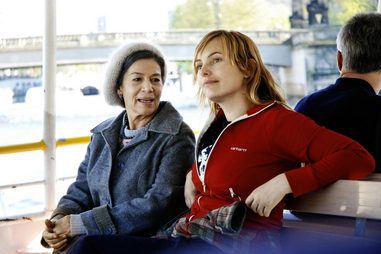There are two worthwhile films for queer moviegoers to catch in theaters in the next two weeks. “Cherry Blossoms,” a German family drama about parents and their estranged children, including a lesbian daughter, opens for a one-week run on Feb. 27 at the Ritz at the Bourse. On March 6, “Eleven Minutes,” the documentary chronicling Philadelphian Jay McCarroll’s experiences designing a line for Fashion Week, opens for a limited engagement.
Writer/director Doris Dörrie’s “Cherry Blossoms” is a tender, life-affirming and, at times, magical drama about Rudi (Elmar Wepper), a man unaware that he is dying. His wife, Trudi (Hannelore Elsner), wrestles with her knowledge of her husband’s short life expectancy. She was hoping to visit Mt. Fuji and see the cherry blossoms with him, and now can’t imagine traveling to Japan alone.
Instead of going overseas, however, Trudi and Rudi head to Berlin to see their married son Klaus (Felix Eitner) and lesbian daughter Karolin (Birgit Minichmayr). They have many awkward moments with their children, and Trudi spends more time with Karolin’s lover Franzi (Nadja Uhl) — touring the city and attending a Butoh dance performance with her — than she does with her own ungrateful daughter.
Yet after Trudi dies in her sleep, Rudi takes it upon himself to fulfill his wife’s dream and visit Japan, where the couple’s third son, Karl (Maximilian Brückner), lives alone. Once there, Rudi’s grief prompts him to dress in Trudi’s clothes to “show her Japan.” These are warm, tender moments, but they can’t mask his loneliness and despair.
Rudi quickly gets on Karl’s nerves, but when he meets the bewitching Yu (Aya Irizuki), a Butoh dancer, he finds a new friend — one his wife would adore. As Yu teaches him about dancing and shadows, and the impermanence of the cherry blossoms, he remembers Trudi fondly, finding a measure of happiness his selfish children cannot provide.
Dörrie mixes realism and sentiment to perfect measure to make “Cherry Blossoms” poignant, not treacly. The affection between Rudi and Trudi is palpable, as is the deep bond Rudi and Yu develop in Japan.
This is a quietly powerful family drama about finding happiness, even in the face of grief.
“Eleven Minutes” is the amount of time it takes a fashion show to be presented on the runway, and this fabulous documentary (which premiered at the Philadelphia Film Festival last year) depicts the efforts of “Project Runway” winner Jay McCarroll to mount his first show. As he makes an attempt to “leap from reality-TV designer to real-life designer,” his life is fraught with stress — and all of it is caught on camera.
McCarroll states pretty honestly that while he has a design for a show — called “Transport” and based on a 1960s architecture concept — he doesn’t know how he will pay for it, produce it, manufacture it, display it, advertise it or merchandize it. And, he admits with some humility, he has to learn fast — because his 15 minutes of fame are ticking away.
“Eleven Minutes” makes the harsh realities faced by a novice designer like McCarroll very real. He frequently fights with his publicist Nancy and her boss Kelly (the PR firm’s savvy owner), and fails to heed their considerable experience and expertise. He sometimes treats his assistants — who work for him for free — badly, yet he never properly chastises the shoe designer who could potentially wreck his show. Furthermore, as issues arise with sales reps, buyers and manufacturers, McCarroll really suffers — sometimes deservedly so. He may appear playful or worried, cavalier or anxious, but what most comes across is his arrogance at having to live up to his notoriety. It’s a telling moment when he tells a reporter, hours before his Fashion Week debut, that he doesn’t want to talk about “Project Runway” anymore.
McCarroll often engenders sympathy during the various ego clashes and wardrobe malfunctions that besiege him. However, what makes him likable is how he plays to the camera. Riffing with his friends and associates — a wig designer he asks to make the hairpieces look like “drunk drag queens,” or the models that have to learn how to move in his clothes — he is incredibly funny and compelling. It shows that if “Project Runway” did not teach him how to survive in the fashion industry, at least it taught him how to play to the camera.
“Eleven Minutes” does provide a crash course in staging a fashion show, and this insider’s view of the industry may be the film’s most useful feature. Viewers will watch, sometimes in stunned silence, as McCarroll fights with his PR firm about the offbeat models he wants to use, a bad meeting with a sales rep and the production, design and distribution of the show’s invitations. In contrast, the other behind-the-scenes elements — such as creation of the cutter’s must, a document that provides a list of the pieces needed to make an outfit, seem almost unimportant in the grand scheme of putting on a fashion show.
Directors Michael Selditch and Robert Tate keep the action nimble as McCarroll flits from one crisis to the next. Significantly, the filmmakers never judge their subject or his decisions — even when he makes a noticeably bad one. Selditch and Tate also wisely pause the action periodically to show McCarroll surrounded by the hot-air balloons that inspired his collection Transport. Not only do these scenes serve to break some of the mounting dramatic tension, but they also amusingly reference all of the hot air being blown around in “Eleven Minutes,” as well as how puffed up McCarroll and the whole industry are.
